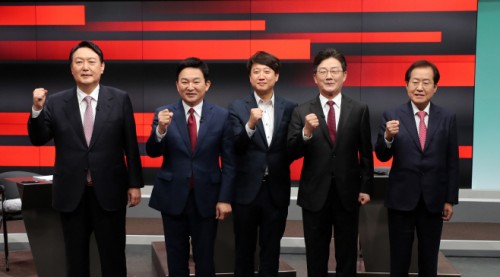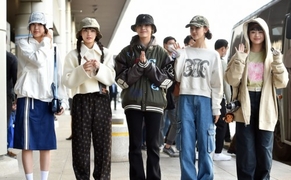 |
| Main opposition People Power Party leader Lee Jun-seok, center, cheers up the party’s presidential contenders in a debate in Gangwon Province on Oct. 27, 2021.From left are former Prosecutor General Yoon Seok-youl, former Jeju Special Self-Governing Province Governor Won Hee-ryong, PPP leader Lee Jun-seok, former lawmaker Yoo Seong-min, and Rep. Hong Joon-pyo./ Source: Yonhap News |
AsiaToday reporter Jo Jae-hak
The party sentiment is expected to determine the final presidential nominee of the main opposition People Power Party (PPP), as the voting session for registered PPP members begins today. This is because the number of new party members has increased by nearly 300,000 since the national convention on June 11, and the proportion of party members voting has increased compared to the second primary session.
According to the political community on Sunday, the PPP will begin voting for the party members starting Monday. Voting for party members will be conducted via mobile devices on Nov. 1-2 and via phone on Nov. 3-4. The general public opinion polls will be conducted for two days on Nov. 3-4 through a phone interview. The final presidential nominee will be chosen on Nov. 5.
The biggest topic in the main primary is the party’s sentiment. The PPP will reflect 50 percent of party member votes and 50 percent of general public opinion polls in the main primary session. As the proportion of party member voting has increased compared to the second cutoff, it will have a greater impact on selecting the final candidate.
It is also noteworthy that the number of new party members has increased rapidly in recent years. About 570,000 members of the main opposition party have the right to vote in the main primary. This is more than double the number from the last national convention held on June 11, which had 280,000 voters. Compared to the second cutoff, the number of voters increased by 190,000.
Of the 190,000 new members, nearly 80,000 members are in their 20s through 40s, accounting for 41.7 percent. It is expected to work favorably for Rep. Hong Joon-pyo, who is broadening his support base with the MZ generation, combining Millennials and Generation Z. In particular, it appears that Hong holds a lead over his rival Yoon Seok-youl in a recent opinion poll.
Despite the large influx of the younger generation, however, the proportion of senior party members is still high in the main opposition party. In the second cutoff, 69.2 percent of party members was in their 50s or older, which accounted for only a slight decrease to 65.6 percent in the main primary. Therefore, many believe that it will be difficult for Hong to have an upper hand over Yoon, who is fully supported by traditional conservatives in Daegu and North Gyeongsang Province and those in their 50s and older.
#People Power Party #presidential nominee #main opposition #Yoon Seok-youl #Hong Joon-pyo
Copyright by Asiatoday
Most Read
-
1
-
2
-
3
-
4
-
5
-
6
-
7





















